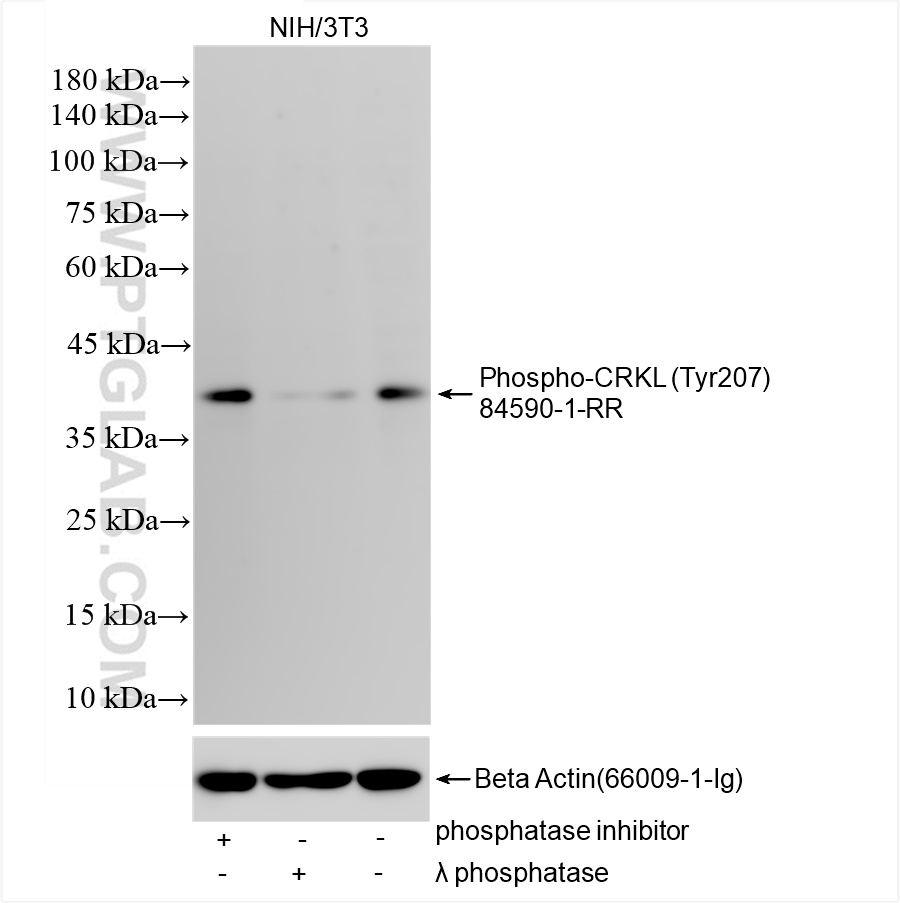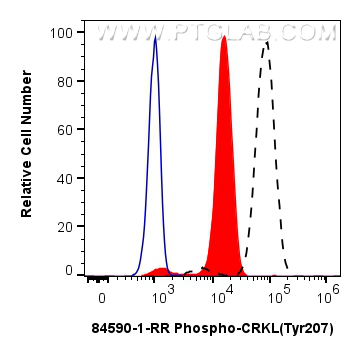验证数据展示
经过测试的应用
| Positive WB detected in | NIH/3T3 cells, λ phosphatase treated NIH/3T3 cells |
| Positive FC (Intra) detected in | λ phosphatase treated K-562 cells |
推荐稀释比
| 应用 | 推荐稀释比 |
|---|---|
| Western Blot (WB) | WB : 1:500-1:2000 |
| Flow Cytometry (FC) (INTRA) | FC (INTRA) : 0.06 ug per 10^6 cells in a 100 µl suspension |
| It is recommended that this reagent should be titrated in each testing system to obtain optimal results. | |
| Sample-dependent, Check data in validation data gallery. | |
产品信息
84590-1-RR targets Phospho-CRKL (Tyr207) in WB, FC (Intra), ELISA applications and shows reactivity with human, mouse samples.
| 经测试应用 | WB, FC (Intra), ELISA Application Description |
| 经测试反应性 | human, mouse |
| 免疫原 | Peptide 种属同源性预测 |
| 宿主/亚型 | Rabbit / IgG |
| 抗体类别 | Recombinant |
| 产品类型 | Antibody |
| 全称 | v-crk sarcoma virus CT10 oncogene homolog (avian)-like |
| 别名 | p-CRKL (Tyr207), p-CRKL, CRKL (Tyr207), CrkL (phospho Y207), phospho CRKL (Tyr 207) |
| 计算分子量 | 34 kDa |
| 观测分子量 | 39 kDa |
| GenBank蛋白编号 | BC043500 |
| 基因名称 | CRKL |
| Gene ID (NCBI) | 1399 |
| RRID | AB_3672086 |
| 偶联类型 | Unconjugated |
| 形式 | Liquid |
| 纯化方式 | Protein A purfication |
| UNIPROT ID | P46109 |
| 储存缓冲液 | PBS with 0.02% sodium azide and 50% glycerol , pH 7.3 |
| 储存条件 | Store at -20°C. Stable for one year after shipment. Aliquoting is unnecessary for -20oC storage. |
背景介绍
Similar to other adaptor proteins, Crk functions primarily to assemble molecular complexes to distribute signals within the cell. The best studied regulatory mechanism of Crk proteins is the phosphorylation at a tyrosine located in a linker between the N- and C-terminal SH3 domains (Tyr221 in human CrkII, Tyr207 in human CrkL). (PMID: 24675776)
实验方案
| Product Specific Protocols | |
|---|---|
| WB protocol for Phospho-CRKL (Tyr207) antibody 84590-1-RR | Download protocol |
| Standard Protocols | |
|---|---|
| Click here to view our Standard Protocols |

